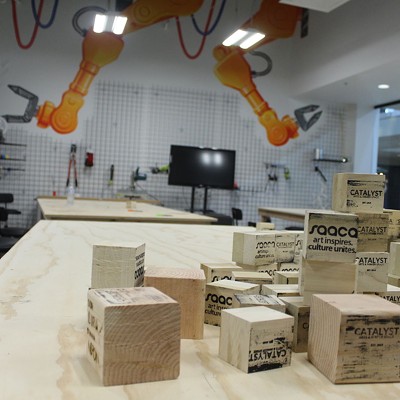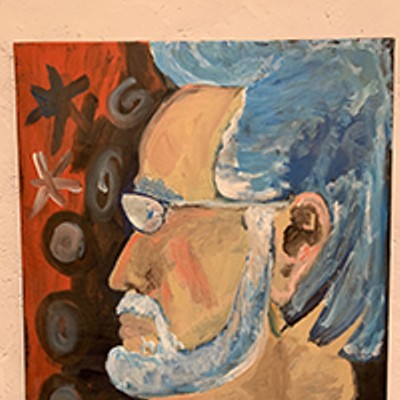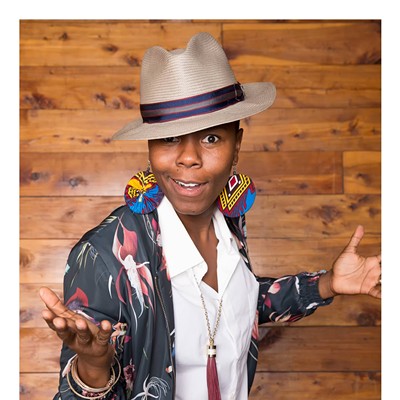There was Pearl's Hurricane, which was the first bar in town to feature punk shows; there was Tumbleweeds on Fourth Avenue, which hosted gigs by Black Flag and X in the early '80s; there was The Night Train, which was mostly a straightforward rock bar, but forward-thinking enough to include early shows from the Go-Go's and Talking Heads on their schedule; and there was Nino's Steakhouse, which featured live music seven nights a week.
And there were publications--most notably Jon Rosen's Newsreal, which ran monthly for almost 12 years before folding in 1985, and artist Howard Salmon's underground 'zine, SLIT (a book of which will be released later this month, compiling all published issues)--and record stores like The Record Room, Wrex and Road to Moscow, to help fuel the interest for cutting-edge music.
But in 2005, all of those are but shadowy memories for the 40-and-up crowd.
Club Congress, on the other hand, which opened its doors 20 years ago initially as a tiny space that hosted a weekly theme party with performance artists called The Counter Club (an abbreviation of "counterculture"), and soon branched out into live music and dance nights, is not only still going strong; it has established itself as a famous venue that caters to musical tastes of every variety. This weekend, the club celebrates its 20th Anniversary with arguably the most ambitious local music festival Tucson has ever seen. For the occasion, we decided to look back at how Club Congress came to be recognized as the downtown nightlife anchor it remains today.
The story begins in 1985, when attorney Richard Oseran and his wife, Shana, teamed up with a few partners to purchase the fading Hotel Congress, which was built in 1919 as a railroad hotel. Eventually, they would buy out their partners to become sole owners.
Shana Oseran: It was considered the first resort hotel in the state of Arizona.
Richard Oseran: One of, if not the original operator's name, was Latz; he was a German. When he ran the place, they would do day trips to Nogales. They would pack food, and they would stop halfway down and have picnics with the hotel guests. Every Christmas, every hotel guest would have a present under the tree. So, it was sort of one of those hotels. Then the Depression hit, and Latz lost the hotel. He went into a depression.
SO: He killed himself.
In 1934, the hotel weathered a fire that destroyed its third floor, and by 1984, the hotel was somewhat in decline--the sort of place in which as many people lived as stayed for a night or two. The owner at the time was Richard Kent, who was advancing in years and wasn't exactly pouring money into the place to maintain it.
RO: I remember going in there once, and being kind of impressed with the fact that, you know, it was old and tired, but there was a sense of tidiness to it, even though it was deteriorating. We bought it in ...
SO: In '84, we started doing procedures, and then the papers were signed in January of '85.
RO: It was clean but deteriorated.
SO: And I would say the neighborhood wasn't good. You had heroin addicts and prostitutes running all around.
RO: It wasn't quite seedy, but it was funky upstairs. It was old. I didn't quite get it. But at some point in my life, I became associated with some really great people who I admired who were in the arts. ... There was a new urbanism then, a search, especially by creative and hip people, to come downtown. ... We got a grant; we borrowed money, and we immediately did the facade and an electrical upgrade. ... We didn't know what we were doing, so it was a rough and rocky start. Adrienne Halpert came in (as manager), who was plenty tough. Our role in the hotel really was a guiding hand, and not to let it go over the precipice. In other words, people just showed up, always. I can remember the day that (future manager) Mary Ann Brazil and (Counter Club founder and artist) Gary Patch showed up. We had nothing ...
SO: They didn't show up together.
RO: Yes, they did, and I met with them. So, Mary Ann goes to work there, and Gary goes to work there.
SO: She was cleaning upstairs.
RO: I don't remember her cleaning, but she was on the front desk, and she was competent and responsible, and a good Midwestern worker, and that's sort of how people moved up in those days. And then one day, Gary Patch and Robert Bray say they want to do this Counter Club, this performance art club. Gary and Mary were friends before they both came to Tucson. So, I said, "Fine." I was open-minded.
SO: We still are today. We bought it just thinking, "Well, maybe this is an investment; it's downtown. But what happened was that after we bought it, these things would present themselves, and new doors would open, and we would just go through that door.
RO: It took on a life of its own.
The first night of the Counter Club was successful beyond anyone's imagination, with people being turned away after the club--which then occupied just a fraction of the space of the current club--had reached maximum capacity. The Counter Club became a weekly affair, with Patch coming up with a new theme for each installment and completely redecorating the space accordingly, down to the paint on the walls. But popular as it was, the Counter Club didn't last long. Meanwhile, by May 1985, Club Congress had already started hosting dance nights and live music.
David Slutes (musician and current entertainment director of Club Congress): How I remember it, the demise of Nino's kind of pushed everything over here. That was my crowd. I mean, even Gary Patch's scene here was kind of intimidating to me at the time. I thought, "Wow, look at this crazy gay art scene." It was really cool, but not my thing, you know? And we just sort of crept in, and little by little, the bands started getting more shows here.
Jefferson Keenan (former Phantom Limbs frontman): Gary Patch was there from the beginning with all of the theme nights and the decorations. Like, the whole club would supposedly be underwater one weekend. The music started right around the same time. Sorta right from the beginning, they were having bands, and it was pretty much wide open. They would let the bands sort of set everything up--book the shows themselves and get their friends to play or whoever, and do the flyers, find the sound man, and just keep the door money. That part of it was sort of band-run at the beginning. ... We would just say, "Can we have this day?" and get the bands together for the show.
DS: I was on the first show ever. Al Perry doesn't like to get into this, but I remember there was a point where Howe (Gelb) was going around saying he had the first show here, and Al said, "No, I think it was me." And at some point, they went back and looked at the fliers or something, and realized it was May 31, (1985)--Al Perry and the Sultry Heifers--the first show. And I had to quickly add, "Al, you forgot who opened up for you that night. It was the Vegas Kids" (Slutes' band at the time). I was the first person on the stage at the first live music gig. ... I remember we were all shocked, because we had been playing at Nino's so long that, I mean, everyone got paid really well. We took money in for bands at the door, and everyone got tons of money. We realized, "What was going on at the door at Nino's?" (Laughs.) I remember Howe walking out of here with $700, and it was like, "Wow."
JK: I liked the openness; the whole DIY thing in the beginning. But then, some of the people that they had as club managers or bookers were just horrible, taking money from bands and stuff.
In 1987, Dan Vinik was hired as a bartender, but would soon become the club's booker. By all accounts, things improved drastically on his watch, as the band bookings increased in number and name recognition. He would hold the position for the next 10 years.
JK: I actually helped Dan into a job at Congress as a bartender. I never knew him from Tucson, even though he's from here, but I knew him from some people in San Francisco. We were supposed to do our first record over there, and he was actually supposed to produce it or something. ... It became a more regular stop for touring acts, the place that touring acts wanted to play if they played Tucson. I don't know if you credit Vinik for all that, or maybe he was just there while that happened, but it was more organized under him, certainly. He had more connections and knew how things worked out in the real world.
DS: He was just a guy hanging out; Keenan knew him or something. Next thing you know, he's booking shows here. But he had this sort of San Francisco weird art-punk cred. And he kinda looks that way, y'know? That's when it hit its stride. I give him credit. When I book, I book on his template, which is really just saying yes to everything. He was the first guy to say, "Yeah, let's do it. Let's try it. What about this? Why can't we try this?" He's really great, and he kept that initial art vibe but had a focus on music. Gary wasn't a music guy, he was an artist; he was creating stuff. Dan was all about the music. He was into booking bands, bringing in touring acts, but also doing crazy shit, all the time.
In addition to gaining notoriety as a live music venue, Congress simultaneously became Tucson's premier dance club.
Spyder Rhodes (Club Congress DJ, 1985-present): I think the club had only been there for about a month before I came along. I was just a pup. I had to lie about my age to get the job; I told them I was 22, and I was actually 19.
DS: This was the biggest dance club in town forever. Spyder Rhodes was doing these dance and techno nights really early, and again, it immediately took off. It was the only game in town for that, too.
SR: At that time, instead of there being a specific style of music, it was more about what was new and interesting and cool, and it was everything from goth and glam rock to industrial music and acid house. It was basically what was the newest, hippest import record, but then we'd also play stuff like the Pixies and the Cure--but then suddenly play N.W.A. or Specimen. It was kind of all over the map, but it was whatever was edgy. ... The only cool places to go that I ever considered competition were the gay bars. The Fineline was hot and huge then, and also a hangout for a lot of straight trendy people. And vice versa. Congress was a hangout for open-minded gays, and The Fineline was a hangout for open-minded straights. ... Everyone else at the time was so safe, so Top 40.
Soon, Congress became a haven for hip misfits of all varieties, a hangout for those who felt out of place in more mainstream bars.
JK: I think it was mostly just the times, and it was terrifically convenient that there was this cool, old bar in this old hotel where they had these great shows, and there wasn't really any other cool place.
DS: Tucson at that time was still in that (mentality of), 'I'm a punk rocker.' 'I'm a cowboy punk rocker.' 'I'm a new waver.' We didn't have enough of us, so we all got along.
SR: I think the coolest memory I have of that place, and the thing that just embodies Congress for me forever, was just how unbelievably eclectic the crowd was, to the point where I could look out at any given moment and see the most hardcore drag queens, with some Rastafarians, a few cowboys, some frat boys and some goths, and whatever. Nobody cared, and everyone got along.
The hipness factor at Club Congress came at a bit of a price. For those not well-connected, there was an undeniable snobby attitude from the regulars, and especially, from the employees. At times, it seemed as if the bartenders were in competition to see who could be the biggest asshole to their customers.
DS: Jack (Veach, bartender) was the surliest, but he made that place; he gave that room, you know--everyone was like, "Fuckin' Jack." "If you're not ready to order, get out of my face. Next! I'm not talking to you. Get outta my face."
JK: The bartenders genuinely didn't like these (college kids), and it became sort of part of their shtick--but they'd do it for regular shmoes like us, too. I never had a problem with any of those guys, really. I always got good service. Maybe they thought I was special or something.
SR: That was the whole attitude: You were lucky to get in; you were lucky to get a drink; you were lucky they even acknowledged your presence. But that was OK then. You could never get away with that now. That was kind of the whole '80s attitude, too, I think. Part of being a scenester was getting spit on a little bit, humiliated.
RO: In the early days, there was an arrogance. It was a hip, intellectual crowd that was so "cool" that they had contempt for ordinary human beings, or people that they didn't view as one of them. If you got served, they thought they were doing you a favor, and they thought that was cool. And that was something that was just totally unacceptable to us ultimately.
DS: That's the only tweak I've made, is making everyone feel welcome.
The ensuing years have seen a slew of changes: bookers and managers have come and gone; both live music and dance nights have weathered ebbs and flows; the club has been remodeled and expanded so many times that the stage has been in no less than 5 different locations; and the legendary "hidden" women's bathroom--a den of iniquity if ever there was one--was removed to the chagrin of all.
DS: It was a hidden bathroom, over by where the DJ booth is now. You probably did a line back there at some point; everyone made it back there at some point. ... That was every band's green room, groupie room, drug and sex room, and everybody who had an inside to the club knew that was the down-and-dirty VIP room. The vilest spot in the club. A lot of things happened there.
SR: I actually made out with the singer from Concrete Blonde in that bathroom. That was a very long time ago. I can't tell you how many celebrities I've seen come out of that bathroom--after long periods of time. It had the greatest graffiti of any room I've ever seen, because it was intelligent and funny. I do remember that when it went away, there was a lot of dissension. People were pretty upset about that. I was on the marketing team for a while, and we ran an ad to apologize for taking the bathroom away.
The women's bathroom may be a lot safer to enter these days, but Club Congress soldiers on, currently boasting the busiest live music schedule in the club's history, as well as two regular dance nights. And, in honor of Congress' 20th Anniversary celebration this weekend, which will feature 50 bands over three days--half of which are reuniting for the event--both Mayor Bob Walkup and Gov. Janet Napolitano have declared the weekend "Club Congress Weekend," recognizing the club as "the longest continuously operating venue of its kind west of the Mississippi River."
DS: I don't know how many other rock clubs in America have gotten gubernatorial and mayoral proclamations--at least not to be shut down forever.










